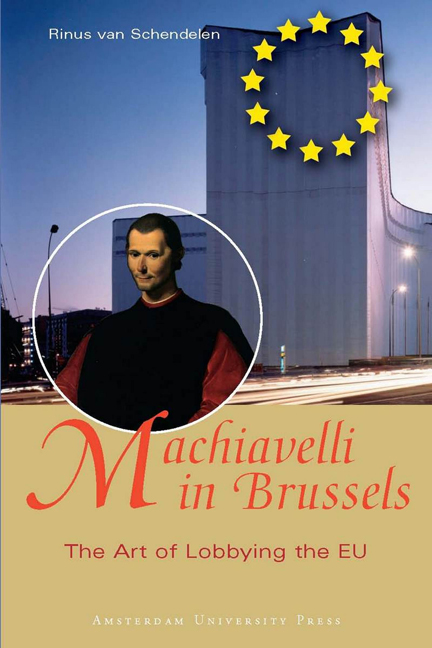Book contents
- Frontmatter
- Contents
- Detailed contents
- Preface
- List of Figures
- List of Abbrevatiations
- 1 The Europeanisation of Public Affairs
- 2 The Playing Field: EU Common Decision-Making
- 3 Pushing the Buttons of ‘Brussels’
- 4 Managing the EU Arena
- 5 Managing the Home Front
- 6 Managing the Fieldwork
- 7 The Limits of EU Public Affairs Management
- 8 Lobbying and EU Democracy
- References
- Index
7 - The Limits of EU Public Affairs Management
Published online by Cambridge University Press: 14 January 2021
- Frontmatter
- Contents
- Detailed contents
- Preface
- List of Figures
- List of Abbrevatiations
- 1 The Europeanisation of Public Affairs
- 2 The Playing Field: EU Common Decision-Making
- 3 Pushing the Buttons of ‘Brussels’
- 4 Managing the EU Arena
- 5 Managing the Home Front
- 6 Managing the Fieldwork
- 7 The Limits of EU Public Affairs Management
- 8 Lobbying and EU Democracy
- References
- Index
Summary
From Tantalus to SCARE
Our preceding chapters on the management of EU public affairs are full of buoyant spirits. The attractive flowers and trees of the EU playing field look like being within the reach of every lobby group. Of course, their harvesting is not easy and requires much homework and fieldwork, to be carried out carefully and energetically. But most lobby groups hold the optimistic belief that sooner or later a lot of flowers and fruit can be brought home as trophies and that they can prune, fructify or dig over the soil during their growth at will. Many even see room for planting better varieties. Tantalus, failing to pick the grapes in Hades, would have loved to go to Brussels. The EU decision-making machinery is certainly full of variables, which can be manipulated to get a desired outcome. But EU public affairs management is not without its limits. The mere pressures of time and efficiency make sure that not everything is a variable, let alone an easily manageable one. Not the sky is the limit, but the players, the playing field, the issues, the game, the audiences and all the other circumstances put together.
The various limits can be classed under different headings. One distinction is between the limits that are endogenously linked to a lobby group and those that exogenously come from wherever outside. Another distinction differentiates between structural limits, caused by patterned behaviour, and cultural ones, set by the individual and the collective minds. More concrete is the classification by communication categories or SCARE. The limits in this case come respectively the Sender being the lobby group, the Channels that transmit the messages, the Arena where all information is exchanged, the Receivers being the EU officials and other stakeholders, and the Environment conditioning the other four categories. In this approach all limits of EU public affairs management are viewed from the perspective of the lobby group sending a message. This message can have a substantial form and contents or be a so-called non-message, for example silence or an absence meant to convey a position.
- Type
- Chapter
- Information
- Machiavelli in BrusselsThe Art of Lobbying the EU, pp. 241 - 278Publisher: Amsterdam University PressPrint publication year: 2004



